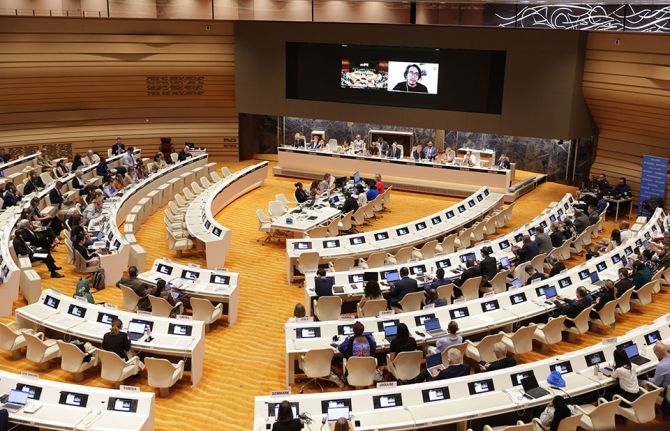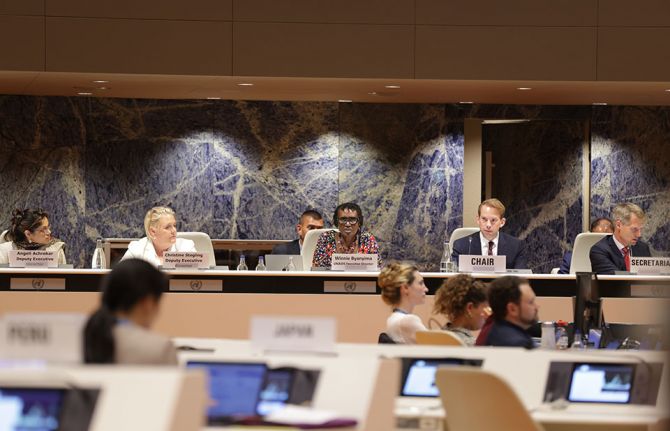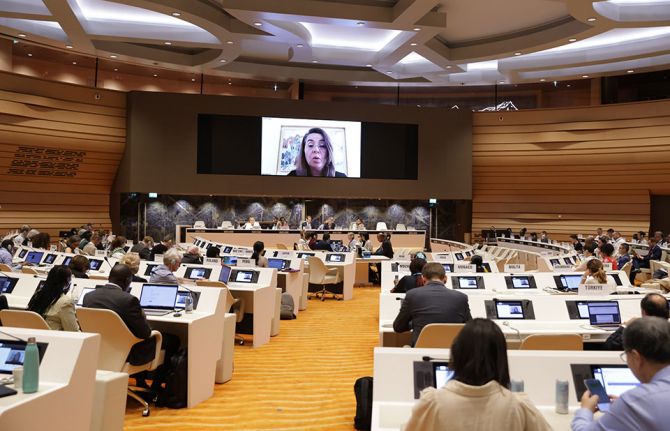



Press Release
UNAIDS Board closes with commitment to resource the HIV response and tackle the inequalities holding back progress
28 June 2023 28 June 2023GENEVA, 28 June 2023—The 52nd meeting of UNAIDS’ Programme Coordinating Board (PCB) concluded today in Geneva, Switzerland with Board members showing strong support to fully fund the Joint Programme and a commitment to overcome the barriers to ending AIDS by 2030.
In her opening remarks to the meeting, the Executive Director of UNAIDS, Winnie Byanyima, described the AIDS response as being under severe strain with the multiple challenges caused by what has been termed ‘polycrisis’. She revealed that in 2021, debt repayments for the world’s poorest countries reached 171% of all spending on healthcare, education and social protection combined—choking countries’ capacities to respond to HIV.
She also highlighted major challenges across a broad spectrum of human rights issues worldwide including women’s rights and gender equality, sexual and reproductive health and rights, the human rights of LGBTQI people, civil society’s freedom of association and more.
“Human rights challenges affect our ability to connect people to health services to control AIDS and all pandemics,” said Ms Byanyima. “We must halt and reverse these harmful trends. Doing so requires longer-term funding as such efforts do succeed over time and funding is critical to stay ahead of the curve.”
She called for global solidarity and a renewed commitment from all partners to get the job of ending AIDS done, for everyone, everywhere. “The work we do together to end AIDS is not only crucial to overcoming pandemics broadly. The global AIDS response is the pathway to advancing progress on other Sustainable Development Goals (SDG’s),” she said.
She noted that just 12% of the SDG’s are on track and that one of the only examples of progress is towards achieving SDG 3 – To ensure healthy lives and promote well-being for all ages – and specifically the progress made towards SDG 3.3, which includes ending AIDS.
Further to the UK’s announcement last year of an increase in funding to UNAIDS from £2.5 million in 2021 to £8 million in 2022, the UK recommitted to maintaining funding for 2023 at £8 million which was warmly welcomed by UNAIDS. As was the announcement of a multiple year 10 million Euro commitment to UNAIDS from Ireland.
Ms Byanyima emphasized the enormous efforts UNAIDS has made to reduce costs including a 10% reduction in total staff costs and the reconfiguration of regional support to countries in Eastern Europe and Central Asia as well as in the Middle East and North Africa. Despite these efforts she raised serious concerns over the US$ 51 million shortfall against UNAIDS core budget of US$ 210 million saying, “We have exhausted all options for achieving greater efficiency in our delivery. There is no scope for ‘doing more with less’.”
A thematic segment was held on the third and final day of the Board meeting on Priority and key populations, especially transgender people, and the path to 2025 targets. This provided the Board with an opportunity to discuss the inequalities preventing progress in the AIDS response for key populations and how the HIV response can more effectively reduce the risk and impacts of HIV among these populations.
Erika Castellanos, Director of Programmes at the Global Action for Trans Equality told her story growing up as a transgender person and her experience living with HIV. She talked about the enormous challenges she faced growing up and why she has committed her life to helping others. Her moving and passionate speech received a standing ovation from Board members.
“We need to do better. We need to stop demonizing - sexualizing and hating trans and gender diverse people, said Ms Castellanos. “More than allies, we need our fellow humans, our family, our friends, our work colleagues, to see us as equal to, as same as, not different from. When we view the world through the lens of what unites us, rather than what divides us, we have a much better chance of improving the lives, health and human rights of all persons on this earth. And after all, is that what we all really want most of all? To love, and to be loved?”
Also, during the thematic discussions was the powerful intervention of Justice Edwin Cameron who formerly served as Justice of the Constitutional Court of South Africa. He urged countries to, “create a legal environment that enables, a system of law that doesn’t disable marginalized and vulnerable groups. To employ the law to empower rather than oppress. It means scrapping pointlessly moralistically, punitive criminal laws. It means equality before the law.” Reflecting how central community-led responses are to the HIV response, the PCB non-governmental delegation reminded all present that communities ‘aren’t just targets of interventions, we are the intervention.’
The Board meeting also provided an opportunity to launch the Compendium of Promising Practices on the role of African faith community interventions to end paediatric and adolescent HIV. HIV prevalence among children and adolescents in Africa remains a deeply concerning issue. As does access to treatment where more than three quarters of all adults living with HIV are accessing treatment compared to only half of children. The Compendium will highlight successful models and best practices implemented by faith-based organizations to share knowledge and strengthen the response to HIV for children and adolescents.
The meeting was chaired by Germany, with Kenya serving as the Vice-Chair and Brazil as Rapporteur. The report to the Board by the UNAIDS Executive Director, the reports for each agenda item and the PCB’s decisions can be found at: UNAIDS Executive Director's report to the 52nd UNAIDS Programme Coordinating Board. The 53rd meeting of the PCB will take place in Geneva on 12-14 December 2023.
UNAIDS
The Joint United Nations Programme on HIV/AIDS (UNAIDS) leads and inspires the world to achieve its shared vision of zero new HIV infections, zero discrimination and zero AIDS-related deaths. UNAIDS unites the efforts of 11 UN organizations—UNHCR, UNICEF, WFP, UNDP, UNFPA, UNODC, UN Women, ILO, UNESCO, WHO and the World Bank—and works closely with global and national partners towards ending the AIDS epidemic by 2030 as part of the Sustainable Development Goals. Learn more at unaids.org and connect with us on Facebook, Twitter, Instagram and YouTube.
